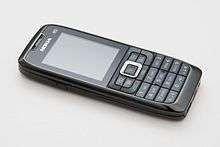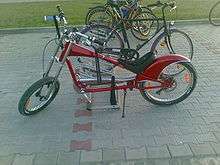Nokia E51
Nokia E51 is a Symbian OS smartphone by Nokia announced on 18 September 2007 as the replacement of the Nokia E50 in the business-focused Eseries line.[1] It was the second Nokia UMTS / HSDPA dual band device. The phone was available with a black, silver or bronze-coloured border and backplate. It has a slim body made of stainless steel (12 mm thick, 100 g weight), and was the smallest Nokia smartphone of the time, yet is still technologically capable like other S60 devices of the time.[2] A version without the integrated camera also existed.[3] The E51 was highly acclaimed[4][5][6] and was succeeded by the Nokia E52.
 | |
| Manufacturer | Nokia |
|---|---|
| Compatible networks | EGSM 850/900/1800/1900, UMTS 850/2100 |
| Availability by region | 2007-2009 |
| Predecessor | Nokia E50 Nokia E60 |
| Successor | Nokia E52/E55 |
| Related | Nokia E63 Nokia E66 Nokia E71 |
| Form factor | Candybar |
| Dimensions | 115 × 47 × 12 millimeters (4.49" × 1.81" × 0.47") 61 cc |
| Mass | 100 g (3.52oz) |
| Operating system | S60 3rd Edition, Feature Pack 1 |
| CPU | ARM 11 369 MHz |
| Memory | Max User Storage = 130 MB (Internal); Free Executable RAM = 70 MB |
| Removable storage | MicroSD Memory Card swappable up to 32 GB SDHC cards. |
| Battery | Nokia BP-6MT, 3.7V, 1050 mAh |
| Display | 16 m color TFT, QVGA (240 × 320 pixel) resolution, 2.0 in (50.8 mm) |
| Rear camera | 2.0-megapixel |
| Connectivity | USB Mass Storage via USB 2.0, miniUSB, Bluetooth 2.0, Infrared, Wifi |
Specifications sheet
| Feature | Specification |
|---|---|
| Form factor | Candybar / Monoblock |
| GPRS | Yes, GPRS/EGPRS Class A, multi-slot class 32 |
| 3G | Yes |
| UMTS | 850/2100 MHz |
| WLAN/WiFi | Yes, Wi-Fi 802.11b, 802.11g |
| VoIP/SIP | Integrated SIP client |
| Main screen | Active Matrix, 16 million (24bit) colours, 240 × 320 pixels, adjustable brightness |
| Still Camera | Yes 2 Megapixel |
| Video recording | Yes 320 × 240, 176 × 144 or 128 × 96, 15 frames per second |
| Voice recording | Yes |
| Multimedia Messaging | Yes |
| Video calls | Yes |
| Push to talk | Yes (Push to Talk over Cellular - PoC) |
| Java support | Yes, MIDP 2.0 |
| Max User Storage | 130 MB |
| SDRAM memory | 96 MB |
| Max Memory Card Size | 32 GB |
| Hot Swappable Memory card slot | Yes |
| Bluetooth | Yes v2.0 + EDR |
| Infrared | Yes (115 kbit/s) |
| USB Mass Storage | Yes, 2.0, miniUSB |
| Data cable support | Yes |
| Browser | WAP 2.0 XHTML / HTML. Comes standard with a full Nokia Mini Map Browser |
| Yes, IMAP4, POP3, SMTP | |
| Music player | Yes |
| Radio FM | Yes |
| Video Player | Yes |
| Stereo Speakers | No |
| Ringtones | Yes, Polyphonic, Monophonic, MP3, True Tones |
| Vibrating alert | Yes |
| HandsFree (HF) speakerphone | Yes |
| Offline/Flight mode | Yes |
| Talk time | 4.38 hours |
| Standby time | 13 days |
| Dimensions | 115 × 47 × 12 millimeters (4.49" × 1.81" × 0.47") |
| Availability | Q4 2007 |
| Software Support | Quick Office Suite
Mail for Exchange |
| SAR | US: 1.38 W/kg (head), 0.75 W/kg (body). EU: 1.47 W/kg (head) |

Photograph taken by the Nokia E51.
gollark: ~~who is secretly TJ08~~
gollark: You could just say "will die at XX:XX:XX on 21 October" plus the "4d6h" thing.
gollark: Yes, also good.
gollark: Also, there's loads of stuff, like, er, custom scroll sort, which I think require JS.
gollark: Er, enabled.
See also
References
- http://www.allaboutsymbian.com/news/item/5943_Nokia_officially_announces_E51.php
- https://www.cnet.com/uk/reviews/nokia-e51-review/
- Nokia E51 No Camera
- https://mobilarena.hu/teszt/nokia_e52_the_most_beautiful_phone/nyomtatobarat/teljes.html
- https://www.techradar.com/uk/reviews/phones/mobile-phones/nokia-e51-220332/review
- https://www.zdnet.com/product/nokia-e51/
External links
| Wikimedia Commons has media related to Nokia E51. |
Reviews, photos and videos
- Nokia E51 - Review by Smape
- Nokia E51 - Review by All About Symbian
- Nokia E51 - Review by CNET Asia
- Nokia E51 - Review by Mobile-review.com
- Nokia E51 - Review by MobileBurn
- Nokia E51 - Review by GSM Arena
- Nokia E51 - Review by Phone Arena
- Nokia E51 - Review by TrustedReviews
- Nokia E51 - Review by Register Hardware
- Nokia E51 - Video Review by The Smartphones Show
This article is issued from Wikipedia. The text is licensed under Creative Commons - Attribution - Sharealike. Additional terms may apply for the media files.